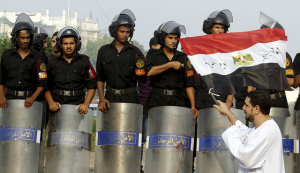
The support of the “Muslim Brotherhood” by the governments of Qatar, Turkey, Iran, and Tunisia, many countries (and not just Arab-Muslim ones) have witnessed a series of protests with a clear expression of sympathy and solidarity with the international religious-political movement. Yet, the reason for this kind of support for the Islamist movement, and, in view of the manifestation in recent years of the special commitment of the Arab-Muslim street to the achievement of revolutionary aims, can we expect to see the internationalization of this process, and the creation on its basis of a kind of “Islamic International”?
Founded in Ismailia (Egypt) in 1928, the “Muslim Brotherhood” movement expanded to about a million members with branches in several Arab countries (especially in Syria and Jordan), but also in Europe by the end of 1940s. In 1958, Said Ramadan, the spiritual successor to the founder of the “Muslim Brotherhood” Hassan al-Banna, his son in law and personal secretary, established the “Islamic Society of Germany” (Islamische Gemeinschaft Deutschland) and a number of organizations in other European countries. Then, the “Muslim World League” was established. In 1961, an Islamic Center in Geneva was opened, becoming one of the largest centers of the “Muslim Brotherhood” in Europe; in 1963, the “Association of Islamic Students in France” was founded; in 1983, “The Union of Islamic Communities in France” was established; and in 1989 the “Federation of Islamic Organizations in Europe” was founded, which is now one of the largest and most influential European Islamic organizations in the world. In 1997, the leaders of the “Muslim Brotherhood” participated in the creation of a representative body of Muslims in England called “the Muslim Council of Britain”.
The “Muslim Brotherhood” also has significant positions in North America. Since the 1950s, Washington has repeatedly engaged in secret alliances with the “Muslim Brotherhood” or their branches in the fight against communism, and work with European Muslims, believing that they could be useful for CIA covert operations. For example, in 1953 at Princeton University, where anticommunist policy was being developed not long before the emergence of independent countries with a Muslim majority, representatives of the CIA and the White House were in contact with Said Ramadan. Then, with the assistance of Washington in the 1960s, the “Muslim Brotherhood” appeared in the U.S. In 1963, the movement founded a “Muslim Student Association”, and later with the help of the “Muslim Brotherhood” the “Islamic Society of North America”, The Muslim American Society as well as several other organizations.
In 1954, after pan-Arabist Gamal Abdel Nasser came to power in Egypt, he began to pursue an independent policy that did not align with the interests of the UK and US. The MI6 and the CIA subsequently began developing plans to assassinate Nasser, with the active participation of the “Muslim Brotherhood” in this operation. In 1979, with the beginning of the Soviet-led campaign in Afghanistan, the special interest of the White House, the CIA and the Islamist “Muslim Brotherhood” created conditions for the latter’s direct support of the anti-Soviet struggle. Many of these “Mujahidin” subsequently became the nucleus of the now well-known terrorist organization “Al-Qaeda”. In 2011, the “Muslim Brotherhood”, with backing from the CIA, were involved in the overthrow of the regime of Muammar Gaddafi in Libya.
In November 2011, the Lebanese newspaper Al-Diyar reported that the US government and the “Muslim Brotherhood” had reached an understanding on the issue of the division of the Middle East. This plan was developed by the CIA in Frankfurt, and former CIA Director D. Petraeus was present at the meeting.
The close links between the “Muslim Brotherhood” and the White House was highlighted by the Egyptian magazine Rose El-Youssef, which gave the names of the six members of the movement, working for the Obama Administration: Arif Alikhan, Assistant Secretary of Homeland Security, and one of the founders of the Global Islamic Organization, responsible for making contacts with the countries of the “Arab spring”; Elibiari Mohammed , a member of the Advisory Council on Homeland Security, known admirer of the founder of the modern Muslim fundamentalist Sayyid Qutb, and allegedly writer of Obama’s speech, demanding the resignation of Hosni Mubarak; Hussein Rashid, special envoy to the Muslim Confederation; Salam Al-Marayati, founder of the Muslim Council of Public Affairs; imam Mohamed Magid, director of the Islamic Society of North America (ISNA), which was founded by the “Muslim Brotherhood”, as well as adviser to the Department of Homeland Security, the FBI and the State Department; and Eboo Patel, member of the President’s Council of Religious Cooperation and the Association of Muslim Students, which the magazine regards as branches of the “Muslim Brotherhood.”
Today, the “Muslim Brotherhood” is an international network, which includes: Hamas in Palestine, the Islamic Action Front in Jordan, numerous cells in Syria, Iraq, Lebanon, Sudan, and even Kazakhstan and Uzbekistan. In total, the “Muslim Brotherhood” now has departments and centers in 30 countries. It is recognized as a terrorist organization in many countries around the world, including Russia.
With active support from Washington and especially the CIA the “Muslim Brotherhood” has been able to establish a powerful position in many countries. It is considered by US intelligence as “a useful tool in the fight against unfavorable regimes”, the movement has strengthened its ranks to include not only ideologically loyal staff members, but also militants who have been involved in armed clashes with governments in Chechnya, Dagestan, Afghanistan, Libya, and Syria, and have already demonstrated their ability to use weapons in Egypt.
While the general upsurge of support for the Islamist movement has not spread to all countries, I want to remind the “strategists” in Washington and Langley of a biblical commandment: “Do not make yourself out to be an idol! Or it will be too late!”
Vladimir Odintsov, political commentator, especially for the online magazine “New Eastern Outlook”.
